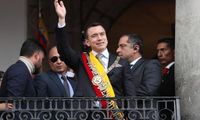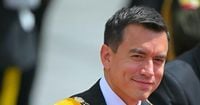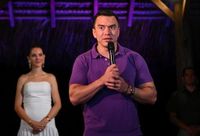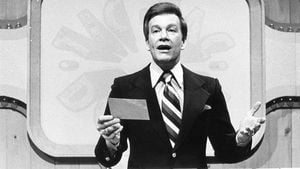Daniel Noboa was re-elected as president of Ecuador on Sunday, April 13, 2025, defeating leftist candidate Luisa González in a tense and polarized election. With 92.6% of the ballot boxes counted, Noboa garnered 55.7% of the votes, while González received 44.3%, according to the National Electoral Council (CNE). The election took place in a country grappling with violence related to drug trafficking and economic turmoil.
As the results were announced, celebrations erupted among Noboa's supporters in the streets, while González, 47, refused to concede defeat, claiming that the election was marred by "grotesque electoral fraud." She stated, "I refuse to believe that there exists a people that prefer lies to the truth" and demanded a recount of the votes.
In a statement made in Olón, Noboa, who is 37 years old, criticized González for questioning the will of the Ecuadorian people, emphasizing the significant margin of victory. "It seems lamentable that with an 11 or 12 point difference, there is an attempt to question the will of the Ecuadorians," he said.
Voter turnout was notably high, with almost 84% of the 13.7 million eligible voters participating in the election. This reflects the mandatory voting laws in Ecuador, where citizens are required to cast their ballots.
The election was marked by a backdrop of violence, with a homicide rate that reached 47 per 100,000 people in 2023, the highest in Latin America. In the lead-up to the election, the government declared a 60-day state of emergency and imposed a night curfew in regions most affected by violence.
Noboa's victory represents a significant setback for the forces aligned with former president Rafael Correa, under whose leadership the country experienced a debt default in 2008. Political analyst Ruth Hidalgo noted, "There is a strong anti-Correísmo that the Citizen Revolution party cannot overcome, and this is the result." Noboa's administration is viewed as a continuation of the fight against drug-related violence, which has escalated dramatically in recent years.
In a country where poverty affects 28% of the population and unemployment and underemployment impact 23%, the electorate was under pressure to seek a stable government capable of addressing these pressing issues. Natalie Ulloa, a 26-year-old administrator, expressed optimism, stating, "We will be better equipped to face the mafia and everything bad that the country has."
Despite the celebrations, the atmosphere remains tense. González's claims of electoral fraud have been met with skepticism by electoral authorities. Diana Atamaint, the president of the CNE, stated, "We must firmly reject the narrative of fraud; unfounded accusations undermine trust in democracy."
Noboa, who has maintained a strong social media presence, is seen as a youthful leader with a tough stance against crime. He has called for military operations against drug cartels, which have increasingly infiltrated Ecuador. His administration has been characterized by a combination of neoliberal economic policies and aggressive security measures.
In the wake of his re-election, Noboa is expected to continue pursuing a hardline approach to crime, with plans to reduce the homicide rate further. He aims to bring the rate down from 47 to 38 per 100,000 people by 2024. However, human rights organizations have raised concerns about potential abuses associated with his security strategies.
Noboa's administration has also cultivated strong ties with the United States, having previously sought military assistance from former President Donald Trump. His economic policies, which include austerity measures and increased taxes, have drawn mixed reactions from the public.
As Noboa prepares to serve a full four-year term, he will face the daunting task of addressing the myriad challenges facing Ecuador, including the ongoing violence, economic instability, and public discontent. The political landscape remains deeply divided, with González's supporters voicing concerns about the legitimacy of the election results.
Political analysts suggest that the path forward for Noboa will be fraught with challenges, as he must navigate a polarized electorate and a country still reeling from the impacts of organized crime. As Ecuador moves forward, the question remains: can Noboa unite a divided nation and effectively tackle the issues plaguing the country?







